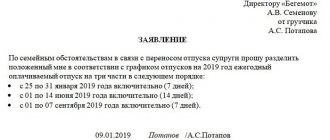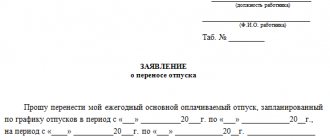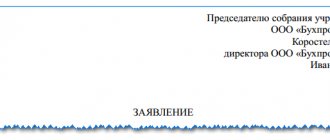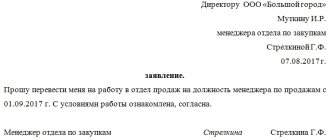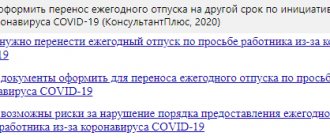In accordance with Article 125 of the Labor Code of the Russian Federation, an employee’s annual leave can be divided into parts. Moreover, the number of such parts is not specified by law, that is, theoretically, the breakdown is possible in any form, even one day at a time.
In this case, an important addition is that one of the parts must be at least 14 calendar days. This means that the remaining 14 days can be divided as the parties agree.
The legislation does not stipulate cases when division of leave is possible, nor does it establish clear conditions for the implementation of this rule. This means that the issue of breakdown is decided on an individual basis by agreement between the employee and the employer.
As a rule, the employee is always required to write a statement either with a request to divide vacations, or with consent to the division proposed by management.
In what cases and how is annual leave divided?
In the Russian Federation, the Labor Code defines the minimum permissible duration of annual leave, and its maximum duration is determined by the internal documents of the organization.
But consent to a rest period in full on the part of the employer is sometimes impossible due to various production situations, the urgency of the work assignment, or in a situation of shortage of workers. Also, some employees prefer to use their free time from work in chunks, resting several times and in different seasons throughout the calendar year.
Labor leave is granted to those who have worked in the company for at least 6 months (Article 122 of the Labor Code of the Russian Federation), with the exception of certain categories of employees:
- pregnant workers applying for exemption from work due to childbirth or pregnancy;
- employees who started work due to the end of maternity leave;
- adoptive parents, if the age of the child being adopted is less than 3 months;
- minor workers.
When dividing an employee’s rest time into parts, the requirement of the Labor Code of the Russian Federation (Article 125) must be taken into account, according to which the duration of at least one of their parts should not be less than 2 weeks (14 days). The remaining time can be divided at the request and agreement of the parties; their minimum duration is not regulated by law.
It is important to consider that dividing vacation time into very short shares (1 day, 2 days, 3 days) may be unprofitable for both the citizens themselves and the enterprise. A short period of time does not provide the worker with the opportunity to fully rest and recuperate.
For an enterprise, the fragmentation of the period free from work complicates the calculation of vacation payments. With a partial vacation, weekends may not be taken into account (not included in it), which leads to an actual increase in rest time.
Important! The optimal solution is to divide the entire rest period into two parts of 14 days. With other splitting options, it is important to take into account the obligation to comply with the duration of 14 days in at least one part of the vacation, especially when the worker is recalled to work early.
For example, an employee used 1 week of rest in different months, and in the next period wished to rest in the remaining days (14 days). In the last period, if problematic production situations arise that require the presence of a specific employee, it will be impossible to recall the latter to work ahead of schedule even if written consent is received from him (Article 125 of the Labor Code of the Russian Federation), without violating the legal requirement for a 14-day rest period.
It is not allowed to split some types of leave:
- educational, since it is targeted in nature and is provided for a specific time period indicated in a special document (call certificate);
- unpaid, since during the requested period the employee does not retain a salary, and its duration is determined as a result of agreement of the parties;
- children's, also related to the target period of release from work.
Reasons for postponing annual holidays to another date
No one can cancel or prohibit taking another paid vacation. The law allows it to be postponed due to certain circumstances for a specific period.
However, it is worth remembering that days must be used within the current period.
The basis for making changes to the schedule may be:
- employer initiative;
- employee's desire.
In any case, the unauthorized transfer of the next paid leave is impossible without the mutual consent of both parties to the employment contract.
Circumstances when the employer is the initiator of not providing production holidays according to the approved schedule:
- Urgent work that is performed by a specific specialist and replaced by someone else.
- Company reorganization.
- Testing of new equipment, implementation of software and computing technologies.
- The manager is on sick leave, and the employee who was going on vacation is appointed as an acting employee.
- Unscheduled inspections at the enterprise.
- Urgent business trip.
Hearing an employer’s request not to go on vacation at the appointed time is not a pleasant thing.
Sometimes an employee has to contact his superiors with a similar statement.
The motivation for the transfer may be:
- family;
- financial;
- production;
- other personal circumstances.
Regardless of the initiator of changes to the schedule, the employee going on vacation must record his actions in writing, but the statement will be different for each case.
Documents confirming objective circumstances must be attached to the form.
How many days in advance should I write?
An important feature of the transfer is the time in which the employer must be notified. Internal documents establish a procedure, including the deadline for writing an application
The standard vacation period provided to an ordinary employee is 28 calendar days.
The employee should pay attention to the fact that if the employer did not promptly notify the subordinate about the start of the vacation period (Article 123 of the Labor Code) or delayed payments (Article 136 of the Labor Code), reviewing the schedule turns from a right of choice into the responsibility of the manager
How is the division of the rest period agreed upon and formalized?
The procedure for dividing free time from work applies not only to the period of the next labor leave, but also to additional days. Any approvals should be made in writing to avoid possible disagreements between the parties to the employment agreement.
Stage 1. Application. An employee can independently draw up a statement addressed to the organization’s management about his intention to use the rest period in several parts. This method is convenient for companies with a small number of employees. The employer is not obliged to satisfy the application received. It is mandatory for the parties to reach agreement on the issue of division of leave.
The Labor Code does not provide for restrictions for a citizen when choosing periods of rest. The requested days in the application may include only working days, working days and weekends together, and weekends. Therefore, the actual duration of vacation may vary. But constantly rescheduling vacations to weekends may raise questions among inspection agencies.
Stage 2. Order. If you agree, the manager will put an authorization visa on the application. Next, an order for leave or its division is drawn up.
Stage 3. Accounting. The information is transmitted to the accounting department for calculating monetary payments due to the employee and to the personnel department for putting marks on the employee’s personal card and on the time sheet. The employee vacation schedule contains actual dates and indicates the basis for determining rest days. In organizations with a large number of employees, it will be more convenient to use a schedule of rest days drawn up by the administration for each employee.
Stage 4. Consent. After reading the document, employees must put a handwritten signature, thereby expressing agreement with the proposed schedule.
For your information! Attempts by the employer to divide half of the allotted leave into small sections without the consent of the worker are not recognized as legal as worsening working conditions (Article 8 of the Labor Code of the Russian Federation). It is also illegal to divide the rest period into small parts falling exclusively on weekends. This time is considered non-working and cannot replace vacation time (Article 21, 107 of the Labor Code of the Russian Federation). Public holidays are also classified as weekends in the Russian Federation (Article 112 of the Labor Code of the Russian Federation).
Example of an application for vacation splitting
General Director of Snezhinka LLP A.V. Sergeev from ICU specialist A.S. Lyutikova
statement.
Due to family circumstances (treatment of parents, education of children), I ask you to divide my allotted leave for 2021 into four parts:
3 days from January 23, 2021; 15 days from March 13, 2021; 5 days from July 10, 2021; 5 days from September 4, 2021
01/09/2017
_______________ A.S. Lyutikova
At the initiative of the employer
Often the vacation period is postponed not at the request of the employee, but due to production necessity.
The reasons for changing the vacation period at the initiative of management may be the following circumstances:
- urgent work has arisen in production, which only this employee can perform,
- there was a need for an urgent business trip,
- the enterprise is being reorganized,
- installation of new machines, systems, equipment,
- unscheduled inspections by a commission organized by higher authorities,
- the manager leaving on sick leave, and the appointment of an employee as the temporary head of a department, division, etc.
It was already mentioned above that management does not have the right to change the vacation date without the employee’s consent, no matter how serious the reasons for such a step.
Is it possible to divide vacation time without the employee’s consent?
If an employee does not want to share the days of the next vacation, the organization’s management does not have the right to prohibit him from such a decision (Rostrud Letter No. 2143-6-1, 09.17.2009). The employee must be given the opportunity to spend the entire time on vacation (28 days), provided that during the current year (calendar) he has not previously used the right to vacation.
If the division of vacation is related to production factors, forced division is unacceptable; the issue must be resolved during negotiations between the employer and the employee.
For your information! If violations of labor legislation are detected, including those related to the provision of annual rest opportunities, administrative penalties are imposed (Article 5 of the Code of Administrative Offenses of the Russian Federation) in the form of a fine on the organization (30,000 rubles - 50,000 rubles) and on the head of the enterprise (1,000 rubles - 5,000 rub.).
Preparing to draw up an order
The order is drawn up based on the worker’s application. That is, the issuance of an order is preceded by the submission of an application by the employee. The employee's application must be visaed and registered. It must have the employee's signature on it. Otherwise, the document will not be valid.
Sample
LLC "Cat's House"
Order No. 3-P
Novosibirsk city
23.03.2020
About rescheduling your vacation date
Due to the temporary disability of sales manager L.L. Zaitsev. in the period from March 22, 2021, on the basis of Part 2 of Article 124 of the Labor Code of the Russian Federation, on the basis of the application of L.L. Zaitsev.
I ORDER:
1. Transfer the annual leave of sales manager L.L. Zaitsev. lasting 10 days from the period April 4 to April 14 for the period from June 1 to June 10, 2021. 2. Head of the HR Department Voronina O.O. make changes to the vacation schedule for 2021, approved on December 17, 2021. 3. Secretary Sokolov O.D. familiarize sales manager Zaitsev with this order by March 31, 2020. 4. I reserve control over the execution of this order.
General Director Grishin I.P. (signature)
The following have been familiarized with the order:
Zaitsev L.L. (signature) Voronina O.O. (signature) Sokolova O.D. (signature)
Regulatory features of dividing vacation into parts
When splitting the vacation, the following nuances are taken into account:
- The duration of vacation regulated by the Labor Code of the Russian Federation (Article 115) cannot be less than the established value. Any reduction in time is illegal, and an increase is permitted in agreement with the company management.
- The legally permissible division of vacation (Article 125 of the Labor Code of the Russian Federation) does not limit the duration and number of parts, with the exception of one of them (at least 14 days).
- Calling a worker who is on vacation to work is allowed only if his consent is obtained. Unused rest time is transferred to a time convenient for the employee (during the current year) or added to the rest period next year. The option is set at the choice of the worker himself.
- The form of consent is not specified by law, but to avoid misunderstandings, it is advisable to formalize it in writing in the same way as an order to return to work early.
- An employee’s refusal to start work before the end of the rest period is not classified as non-compliance with labor discipline (GD of the RF Armed Forces No. 2, 03/17/2004).
Even with consent, the law does not provide for recall from vacation:
- pregnant workers;
- minor employees;
- working in dangerous, harmful types of work.
For your information! In some cases, organizations may force workers to pay out the balance after using a continuous 14 days of part of their vacation in short installments, indicating the corresponding requirement in the company’s local regulatory document. This provision of the internal document contains a requirement for a mandatory division of the period free from work (which contradicts the Labor Code of the Russian Federation (Article 125)) and at the same time worsens the position of employees in comparison with the current norms of labor legislation, and therefore cannot be applied (Article 8 of the Labor Code of the Russian Federation) .
Rules for drawing up an application
There is no standard form for writing an application to postpone a vacation, so it is usually drawn up in any form. Many enterprises have developed their own sample of this document, which is approved in the company’s accounting policies.
There are certain requirements for the content of the application:
- In the top right corner, information is written about where this application is sent: full name of the employer (the name of the organization must correspond to the constituent documents);
- then “director” or “general director” is written, but only as written in the staffing table;
- Full name of the head;
- Next, information about the applicant is entered in detail;
- Below, in the middle of the line, the name of the document is written - “Application”;
- Next comes the main part of the request - a request to postpone annual leave. In this case, the time for which this vacation is planned must be specified (according to the vacation schedule);
- In addition, the time for which it is desirable to postpone it is indicated. In both cases, the dates are recorded in full: the day, month and year when the planned and desired vacation period begins and ends;
- Since the transfer is needed due to some circumstances, they should be indicated;
- Upon completion of the document, a date is set that corresponds to the date the document was transferred to management;
- The appeal is signed by the applicant.
Sometimes additional papers are attached to the application. Their presence should be documented. Such documents include, for example, a health certificate.
Application for vacation compensation (sample).
